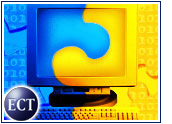
Hewlett-Packard posted a profit gain of nearly 50 percent in the first quarter, but sales fell short of expectations, raising concerns about the personal computer and enterprise equipment markets for the rest of the year and sending a ripple through the stock market.
HP said sales were up 57 percent over the year-ago quarter to US$17.9 billion, but down from the third quarter, which was the first reporting period since HP closed its $19 billion acquisition of Compaq in May 2002. Net income in the first quarter rose to $721 million from $484 million.
Outlook Uncertain
Putting a bright face on the results, HP CEO Carly Fiorina said HP’s profit performance came despite “weak commercial spending” on information technology.
“It’s difficult to declare a trend in IT spending for 2003,” Fiorina said in a conference call, noting that published predictions range from a 5 percent drop in spending to a 6 percent increase. “Predictions are difficult. We are staying focused on what we can control and remain focused on improving profitability and executing in the marketplace.”
HP confirmed analysts’ income expectations for the second quarter but did not issue sales guidance. “The IT environment continues to be iffy,” HP CFO Bob Wayman said.
Cutting Corners
HP’s improved bottom-line performance stems largely from cost-cutting in the wake of the Compaq merger. The company already has slashed some 12,000 jobs worldwide and has announced plans to cut up to 5,000 more as it continues to integrate the two companies’ operations.
But Aberdeen Group analyst Peter Kastner told the E-Commerce Times that HP can continue paring costs for only a finite period of time before it must boost profits by growing its business again. “People are ready to see what happens next, whether [HP] can turn the next corner,” he said.
“If the overall market isn’t growing, then it’s incumbent upon companies to find ways to grow market share,” Kastner added. “But everyone has that same goal.”
In fact, HP’s traditional sweet spot, the printer business — where it remains number one with 59 percent market share, according to IDC — faces a new incursion from Dell Computer, which already is challenging HP for the top spot in the PC marketplace. Dell announced at a technology conference Tuesday that the first products in its long-anticipated printer line will ship early next month.
U.S. Especially Weak
Palo Alto, California-based HP said that although some regions saw higher sales, revenue dropped 7 percent in the United States and Canada and fell 6 percent in Japan. Europe and the Middle East helped offset some of those losses.
Worldwide server unit sales fell 6.5 percent from the fourth quarter, and services revenue dropped 3.4 percent to about $3 billion worldwide. But HP said it continues to dominate certain markets, such as the blade server niche, and noted that outsourcing of help desk and similar support services appears to be a growth area going forward.
“This is clearly a business operations story,” Fiorina said.
Buying Time
Yankee Group analyst Andrew Efstathiou told the E-Commerce Times that HP has proven there were massive cost savings to be had through the merger with Compaq, but that long-term success requires growing the combined business to levels neither company could have achieved by itself.
He said it seems Fiorina and other executives at HP understand that message, based on the company’s efforts to expand further into storage with Microsoft as a partner, and to find ways to leverage its large consulting and outsourcing division in the face of reduced demand for high-cost consulting.
“The merger went through just as tech spending seemed to have hit rock bottom,” Efstathiou added. “I think that’s bought them a little more time to make the case this was the right move.”

















































Social Media
See all Social Media